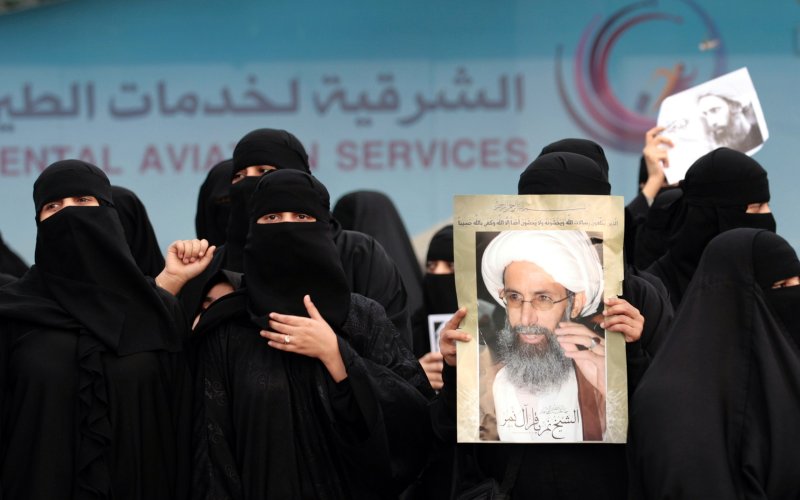By Majid Nawaz
The country executed 47 people on Saturday, for crimes all too similar to those cited by ISIS.
Most countries ushered in their new year by hosting increasingly beautiful displays of fireworks. Others, by increasingly archaic displays of public execution.
Today Saudi Arabia executed 47 people which is the biggest mass execution in the kingdom since the early 1980s.
This follows a blood-soaked 2015, in which the country executed 158 people, the highest number in two decades and a 90% increase from the year before. Despite that staggering sum, with their actions today the second of January 2016, Saudi Arabia is already almost a third of their way to beating last year’s abysmal record.
Indeed, this strict Sunni-Wahhabi religious kingdom, one of the few absolute monarchies left in the world, still stages public executions, crucifixions and floggings. The death penalty is applied in a wide range of cases, including apostasy, terrorism… and witchcraft. Though most of those killed today were accused of terrorism, one must remain incredibly skeptical about the justice system of a country in which even atheism is deemed a terrorist offense by law.
Among those killed today was Ayatollah al-Nimr. Nimr was a vocal Saudi-Shia opposition cleric who publicly criticized the ruling al-Saud family and called for elections. In 2011 Nimr said that he favored protest over violence, “The weapon of the word is stronger than bullets, because authorities will profit from a battle of weapons.” The Saudi interior ministry however, accused him of being behind attacks on police and allying with another regional theocracy, Shia Iran.
In fact, Saudi Arabia’s regional tension with Iran has reached such levels that it is prepared to countenance the execution of minors. A 17 year old relation of al-Nimr has been sentenced to crucifixion—his headless corpse to be displayed in public for several days. And Abdullah al-Zaher, who was 15 when he was arrested also awaits beheading. This makes him the youngest person so far to be sentenced to death.
Beyond executions, Nobel Prize nominee Raif Badawi, a blogger who started the “Free Saudi Liberals” forum in 2008 has been convicted of “insulting Islam” and given a 10-year prison term with 1,000 lashes. And as Lujain al-Hathloul’s and Maysa Al Amour’s imprisonment shows, women still can’t drive in Saudi Arabia. Nor apparently, can they use social media to complain about being unable to drive. Meanwhile, neighbouring Yemen has been carpet-bombed to oblivion by the House of Saud.
That one of our closest allies could maintain such an appalling human rights record should be a matter of deep shame to America and Great Britain. In today’s Information Age this barbaric track record can no longer be hidden from view. Under increasing pressure, the UK Ministry of Justice dropped a large contract to train Saudi prison staff. This decision was initially opposed by Prime Minister Cameron, who only reversed track after facing a sustained human rights campaign. To his credit, Justice Secretary Michael Gove backed the move.
And here’s the rub. While Iran is no better, through Saudi Arabia the absurdity of our global alliances are laid bare. This medieval throwback of a regime—our ally—believes in and enforces many of the same punishments as those they are helping us to fight: ISIS. As this graphic shows punishments for apostasy, blasphemy, homosexual acts, treason—which could mean anything from organizing political opposition to acts of militancy, adultery, fornication, highway robbery and banditry are identical under Saudi law as well as under ISIS rule. In both cases, these punishments are justified by a medieval take on Islamic scripture.
Just as ISIS does, a Saudi interior ministry statement issued today began with passages from the Quran and cited Prophetic tradition in order to justify the mass executions. The Grand Mufti Sheikh Abdulaziz Al al-Sheikh appeared on television soon after to describe the killings as just and Fawzi al-Zafzaf, a scholar from Egypt’s highest Sunni authority Al-Azhar, welcomed the executions by saying “Saudi Arabia has applied the law of God.”
Among the Prophetic traditions cited by Saudi’s interior ministry was one from the books of Sahih Muslim: “whoever comes to you while your affairs are united and wants to disunite you, sowing dissension amongst you, kill him.” How funny, just like ISIS, I had used this same hadith during my days as a committed Islamist, arguing for the necessity of forcibly unifying all Muslims behind a global Caliph, and overthrowing the Saudi regime as an obstacle to such unity.
And here’s the rub. The Islamic State group seeks to enforce a totalitarian version of Islam over society. The Islamic Republic of Iran claims it already enforces Islam, and fights the ‘Islamic State’ by supporting the Party of Allah—or Hizbollah, to do so. Saudi Arabia claims that the Islamic Republic of Iran, the Party of Allah, and the Islamic State group have got it all wrong, and that they enforce the true version of Islam in their kingdom. Monty Python’s Judean People’s Front would be bitingly proud.
Until we recognize that the ideology calling for any version of Islam to be imposed over people is wreaking havoc in the region, and holding entire societies back from progress, the Middle-east stands little chance of recovering from the turbulence it currently faces. Saudi Arabia just happens to be one of the wealthiest, most organized, and most active proponents of this idea. And like homophobes hating their closet gay side, the Saudis have threatened to sue anyone who compares them to ISIS. So sue me.



























